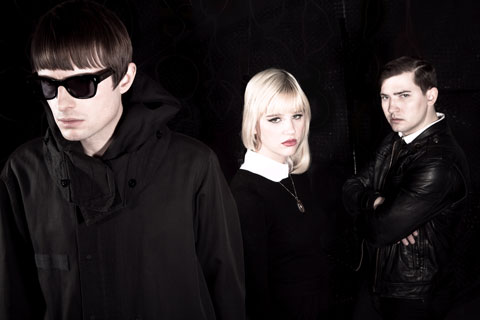
NO THROWBACK “The records I like from that period [the ’80s] are pretty timeless to me,” says Wes Eisold (left). |
Wes Eisold didn't realize he was undergoing the experience that would inspire Cold Cave's Cherish the Light Years until the experience was over. As it happened, the ex-Bostonian and hardcore/noise-rock vocalist for American Nightmare, Some Girls, and others had some free time last summer and decided to get away from his current home."I had wanted to get out of New York and go to somewhere a bit more remote to write. I actually ended up not writing at all but rather just going and looking at these places and taking them in." Said "places" are the remnants of Eisold's military-brat childhood: Rhode Island, Boston, Maine. Each location marked a different period of the now 32-year-old's youth. And different music: new wave, post-punk, noise. They're all genres that show up on Cherish the Light Years.
But the nostalgia wasn't always sweet. "I came to this conclusion shortly after that it was a way of letting go of these idealistic fantasies I had built up for so long in my head, about the way things could have been different or loves that have been lost or people who've died — just different relationships and all these unanswered questions. I realized that it wasn't that real. As someone who grew up moving every two years because of my parent's job, I guess I always held onto the fact that things would have been better had I stayed in one town."
Just listening to Cherish the Light Years, Cold Cave's Matador-released second album, won't let you in on this backstory. Its sound is so deeply smitten with the most potent synth-pop and post-punk of the '80s that it comes off as something of a love letter — even as that sound contrasts with Eisold's agitated moan and funereal lyrics. Those synths are particularly spry, shooting sweet shock waves through the record. Unlike 2009's Love Comes Close, with its lower-key feel, this record is gigantic; a rich gloom fearlessly takes center stage on the slicing "The Great Pan Is Dead" and the electro whirlwind of "Confetti." Eisold attributes the increased weight to the addition of bass — older Cold Cave material leaned on a synth and a kick drum. When you consider that he started the project using thrift-store Casio samplers, the production upgrade feels massive.
Eisold contends that though the sound draws on music he discovered in his childhood, it grapples with more complex issues lurking beneath its handsome surface. "There's totally the element of nostalgia to it, but it was important to me that it's not just that. It has to be in relation to the present. The records I like from the time period are pretty timeless to me." When he listens to New Order, Depeche Mode, or the Cure now, they don't make him think about the '80s. "They sound like they could come out now, even though I understand that other people probably see it different."